The Secret Weapon Helping the Writers Guild Win This Strike
Let's all bow down to the unsung heroes of the WGA strike...lot coordinators
“Lot coordinators are the backbone of the strike's picketing operation,” Patric M. Verrone, former Writers Guild of America West president and member of the Guild’s negotiating committee, told me this week. “They keep us hydrated, make sure we're wearing our sunblock, and even help us safely cross the street. Personally, no one has taken this much care of me since my mom.”
JUDALINA NEIRA JUST WANTS SOME FUCKING SHARPIES
Two weeks ago, Judalina Neira would wake at 6AM, pick up her phone, and immediately begin to answer the dozens of emails waiting for her concerning the picket line at NBCUniversal Studios where she serves as a specialized strike captain called a lot coordinator – one of the largely unsung heroes of the current WGA strike. To placate her grumbling husband beside her in bed, Neira — a WGA member since 2013 — now forces herself to get up and help save her union and the wider Hollywood film/TV industry from her office desk. With a vaguely terrified chuckle, she’s quick to point out to me that she had no idea what she was getting herself into when she volunteered for a role that involves wrangling not only membership, but also coordinating with other labor unions, police, and studio security, filling out accident reports when her picketers are struck by cars, and, on occasion, scheduling all-female mariachi bands.
In fact, none of the lot coordinators who rallied to support the WGA’s strike against Hollywood’s studios and streamers understood what they were taking on. That’s because this strike is unlike any in the Guild’s history. Let’s use the 2007-08 strike as an example. Most members struck their own TV series, meaning the studio lots where their own shows were produced. You picketed where you worked, alongside people you already knew. Your show’s captain had a handful of members to juggle, not hundreds.
COVID changed that.
With so much of the membership now fractured by Zoom rooms, the Guild decided to instead organize the strike in a more militaristic way from the top down. Membership could now picket wherever they wanted and lot coordinators were recruited, quickly trained (if you can call it training, based on what I’ve heard), and assigned in groups of two to four to every studio or streamer to somehow hold it all together.
“At the beginning, there was a massive learning curve because we didn't know what we didn't know,” Neira told me recently. She looks very much as she did when we met more than a decade ago while working on TV series in adjacent offices — except, that is, for the husband doing yard work behind her as she Zooms with me. “In the first couple of days, we had lot coordinator meetings on Zoom with WGA leadership, and we did a lot of debriefing and, to be candid, a lot of griping like, ‘I don't understand why I still don't have Sharpies – I need fucking Sharpies!’
Poster board proved another challenge despite how necessary it was to make useful things like picket signs to wave at struck companies, passing drivers, and phones desperate to splatter them across the internet. After numerous pleas for more, she was told to just “bring some from home”.
“Oh, so that’s how it’s going to be?” Neira said, describing her reaction. She and the other lot coordinators weren’t cast adrift by the Guild, but in this system, given the scope of the organizational effort behind this strike, they would have to solve many of their assigned lots’ problems with their own creativity.
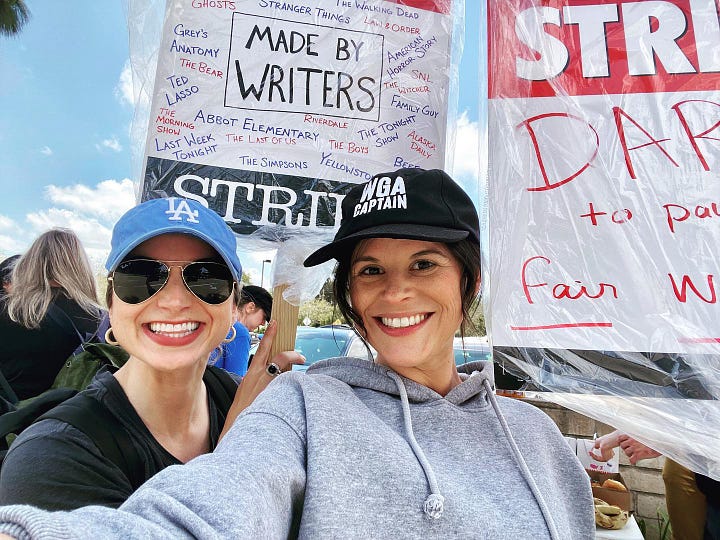
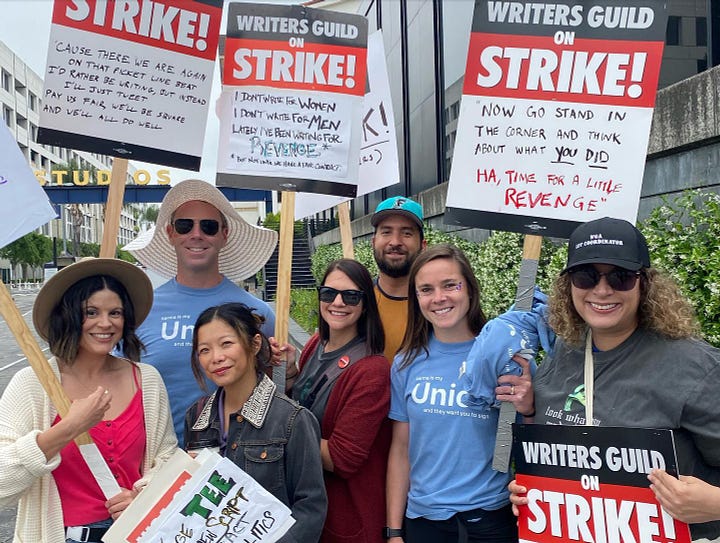
SINK OR SWIM, SUCKAS
Nicole Yorkin is a member of the WGAW Board of Directors and the negotiating committee. She’s also a friend of ten years now, ever since we met to discuss a possible TV collaboration. “We couldn't do anything without our amazing lot coordinators,” she told me. “I honestly don't think most of them knew what they were signing up for when they agreed to do the job, pre-strike. But suddenly, there they were…coordinating this giant organizing effort on the ground.”
MOLLY NUSSBAUM WANTS YOU TO HAVE MORE FUN


When Molly Nussbaum answered my phone call, she’d been back in Los Angeles for less than twenty-four hours after a quick trip to visit family just outside Philadelphia. She landed at LAX the night before at 9:45PM and was on the picket line again by nine the next morning. She’s one of the four lot coordinators for Paramount and Raleigh Studios, recruited, in part, because she earned herself an Organizational Leadership degree from Gonzaga University during COVID. For her, this strike has been a much-needed injection of community among Guild members.
“I think many of us have been isolated the last few years with the pandemic,” she told me during our conversation. “I had a ten-week job this year that was in person, but before that, my last three rooms had all been on Zoom. There's a lot to complain about [in this strike], and certainly we get that, but I think the pandemic has in a strange way, made us all more grateful to be together in person.”
Nussbaum, a “Jewish mother deep down” in her words, as preoccupied with making sure everyone has water and sunscreen as the issues at stake in this strike, says her role as a lot coordinator is to “make picketing an easy and enjoyable experience every day so members keep coming back.” This might be why she describes the vibe at Paramount’s main gates on Melrose Ave. as a block party. “There's a lot of chanting and singing. We have a karaoke machine that comes through every so often. Celebrities with all sorts of treats. You know, people bringing pizza and doughnuts at all times, which is great.”
Things can change when a production truck gets turned away because its drivers refuse to cross picket lines. Cheering is not uncommon. “I don't blame people,” Nussbaum said. “It feels really good. Some days, you walk around in a tiny circle all day. You wonder, did this matter? Did this mean anything, you know? It can be a very mentally draining process. So, when you do have a win, even when it's just a truck making a U-turn or, it makes a big difference.”
Nussbaum hopes it’s her last day at Paramount when she goes home every day. “But at the same time, I realize it’s probably not,” she explained. “I don’t want people to get burned out or to feel like it’s too hard, because every time we show up, we have some kind of victory.” It’s not just about the visibility that such an iconic studio provides the WGA during this strike or the celebrities who drop by to show their support. “We turn away trucks, we slow down productions, we make people uncomfortable about crossing picket lines – that's important.”
A NEW KIND OF GUILD
Like Nicole Yorkin, Angelina Burnett is a member of the WGAW’s Board of Directors and negotiating committee. Her fearsome organizing skills have always left me awed, so I wanted to get her opinion about what Judalina Neira, Molly Nussbaum, and the other members like them are pulling off during this strike. “Some of our lot coordinators are activists and organizers in their non-writing lives too,” she told me over email. “They took part in the uprising in the wake of George Floyd's murder. They've been engaged in local politics, supporting our unhoused neighbors, and trying to bring a more compassionate and progressive vision to the city council. They understand the power of collective action and they're bringing that energy and passion to the work of organizing the membership. We are so very lucky to have them.”
LOTS, LIKE MY SIBLINGS, ARE NOT CREATED EQUAL
“To be honest, Disney and CBS are still the preferred lots for the Valley because they're more relaxed, they’re more shaded,” Judalina Neira explained as we chatted. “It's easier to just kind of walk around and stroll. NBCU and Warner Brothers are big, large lots with a ton of gates, and it's hot, and there's no shade. And so, it starts to feel a little bit like the wall in ‘GAME OF THRONES’” – we must hold the wall!”
DANNY TOLLI CAN’T STOP, WON’T STOP


“I dream of car horns now,” Danny Tolli told me during our phone call, laughing about the loud support WGA picketers receive from people driving past Netflix where he is a lot coordinator. “My husband is in the industry, and he came out to support us. He stayed for an hour and said I must come home shell-shocked every day. But the horns are actually kind of soothing now.”
Tolli is from Queens, the son of Argentinian immigrants — one of whom belongs to the American Postal Workers Union — and describes himself as “union to the bone”. He moved to Los Angeles on the heels of the 2007-08 Writers Guild strike and got his big break on Shondaland’s “THE CATCH”. But as of May 2nd, he’s been responsible for ensuring that picketers outside Netflix’s Sunset Blvd. offices are properly supplied and safe from 9AM to 1PM every day. He and the lot coordinators he works with at this location have a lot to juggle given how many WGA members have serious beef with the streamer.
“Listen, it’s lively here,” Tolli said. “Netflix is in the heart of Hollywood. It's easily accessible by public transportation. The parking situation in the neighborhood is really good, so we have a lot of pros to coming to our lot location.
“I think that the reason that there’s been such high turnout is that Netflix was the first streamer to, like, really break the industry. A lot of people are frustrated and upset by their policies. That they're a tech company and they came in and we had an opportunity to work for this brand new shiny, you know, toy. They were buying shows left and right and they were doing these huge mega overall deals. So, it was an incredible opportunity. But then the mini-room situation happened. Then, working for minimums. The fact that showrunners are, you know, working on their shows, delivering post-production and not getting paid…that is what where we find ourselves today.”
Tolli, like the other lot coordinators, had no idea what he was agreeing to when he took on this responsibility. That first day, with hundreds of people suddenly in his care, was “complete madness” in his words. But after three weeks of it, he’s begun to acclimate and is even contemplating socializing again after initially canceling his private life. That is, if he ever gets home to his husband. “I find that I have to, like, force myself to move away from the line, because the excitement and the adrenaline takes over and I don't leave at 1:00,” he told me. “I leave at 1:45 or I leave at 2:00. Or Imagine Dragons shows up and I leave at 5. I get home and I'm dead.”

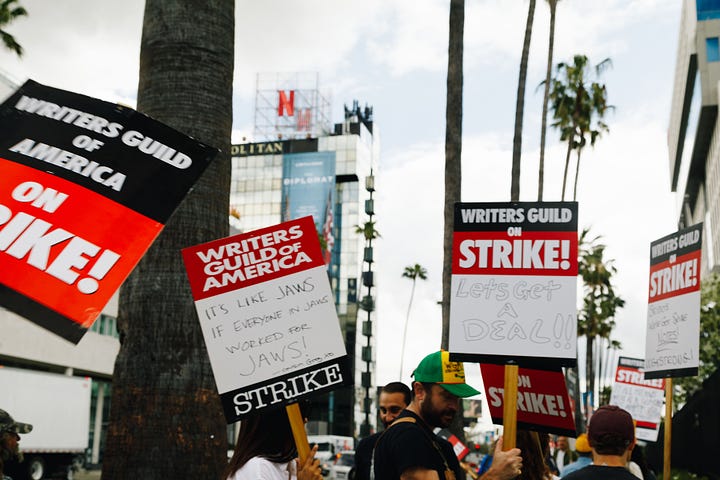
CAPTAIN PICARD, TAYLOR SWIFT, AND A SCREENWRITER WALK INTO A BAR…
“These folks get thrown a lot of shit,” Nicole Yorkin said, continuing to praise the WGA’s lot coordinators. “Especially in the early days before things were as coordinated as they are now, like giant crowds showing up for special theme days – whether it be Star Trek Day, Picket Karaoke, Taylor (Swift) Tuesday, or impromptu performances by Weezer or Imagine Dragons – and they always roll with it, never losing their cool in the process. And guess what, they're all writers like the rest of us. That's what I love about this whole system!”
Judalina Neira is something of an expert on this subject by now. “To be candid, NBCU does not have the highest turnout,” she said, describing one of her biggest challenges as a lot coordinator at the moment. “We are not a sexy lot. So, what we have found is in order to keep our gates and our lot well-staffed, we have to do a lot of events and invite a lot of groups. That's why my job feels much more like party-planning. We find that if we do theme days or different events, we can get a more consistent turnout.”


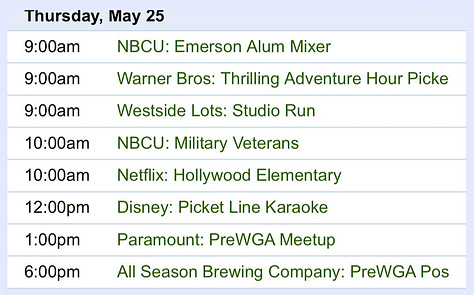
BRITTANI NICHOLS IS OVER THEIR BULLSHIT
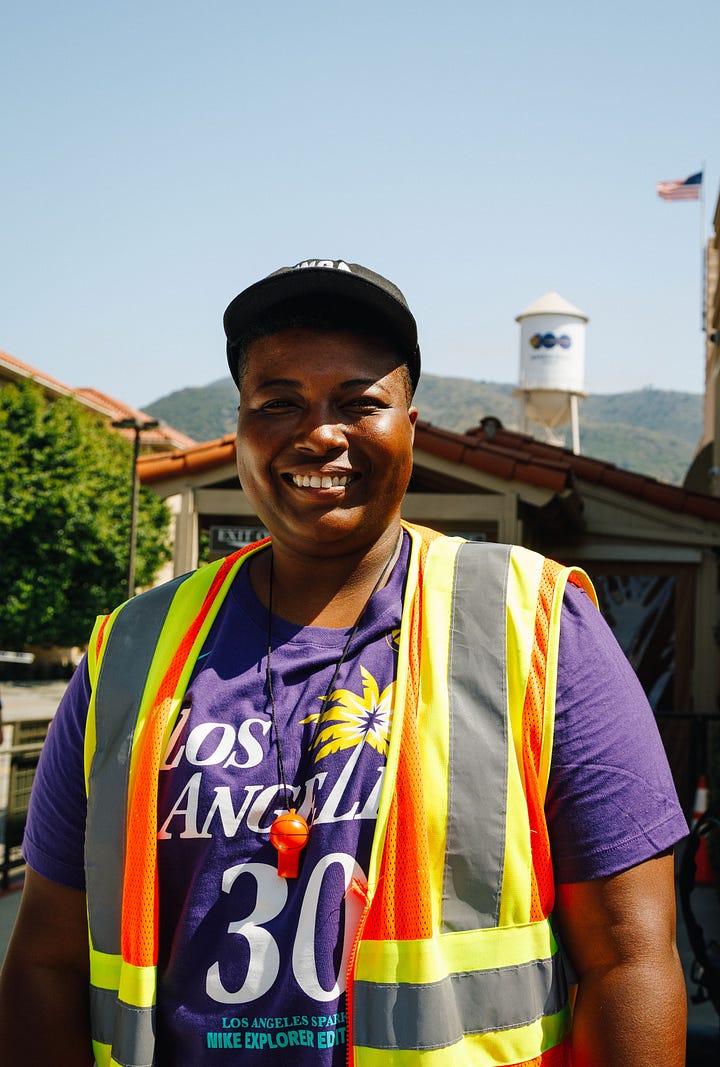
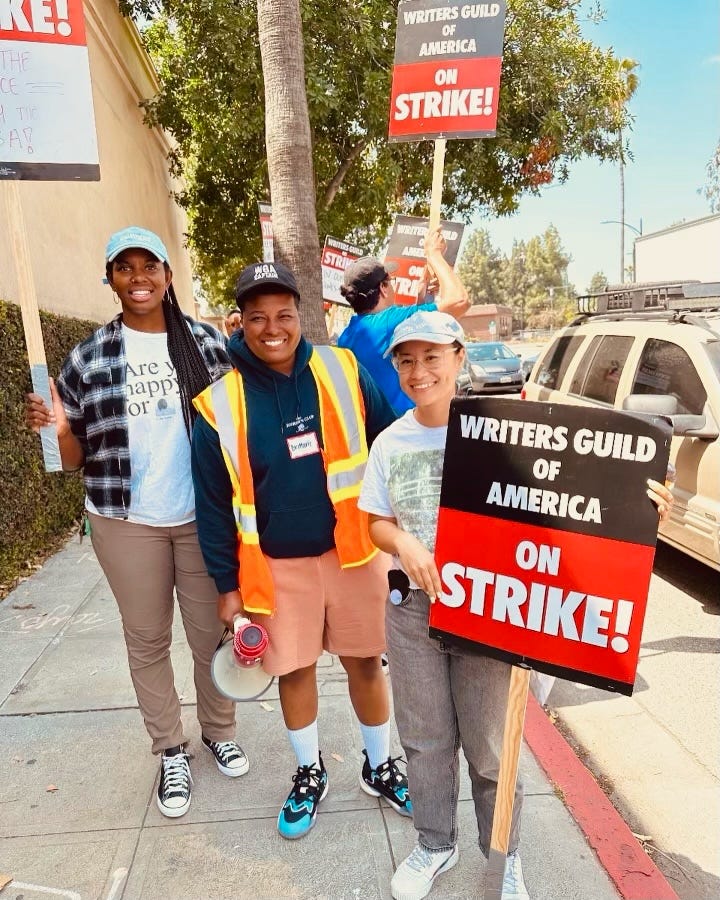
“So, Warner Bros. is a bit of a block party,” Brittani Nichols told me over the phone with more than a hint of pride, which might have something to do with all the food that’s regularly delivered. Fandoms for shows like “OUR FLAG MEANS DEATH” and celebrities keep picketers well-fed. Nichols — a Chicagoan native who joined the WGA in 2015 and comes from an organizing background — never even thinks to have breakfast before heading to WB for her shift as lot coordinator there because she knows she will never go hungry.
“But it’s also where you go when you want to do some serious service,” she added. The immense studio has numerous gates to picket, often at great distances from each other, resulting in each developing its own daily vibe depending on what kind of members, sister union members, and general supporters show up at each. “If it’s the musicians at the executive gate, then you know it’s going to be a jazzy day. And if it’s a show reunion, then it’s going to be a talky day.” In all cases, picketers can count on WB harassing them, something no other lot coordinator I spoke with cited as an issue.
Security is regularly sent to complain about signs that cross lines, water being placed in the wrong areas, or taking too long, in their minds, to get out of the crosswalks. “They really just try to nitpick anything to try to catch us up,” Nichols observed of the manufactured grievances. She’s sounded upbeat up to this point, even positive, but her tone changes. “It’s trying to get a rise out of us, to get us to react in a way where they could point to it and say, ‘Hey, look at them doing this bad thing.’ We just have to not take the bait.”
So-called “neutral gates” are Nichols’s biggest pet peeve. Here is the Teamsters’ explanation of these:
A reserved gate system is established when there are multiple employers at a common location and an employer expects union picketing to occur against one or more, but not all, of the employers on site. In such an instance, an employer may create a separate entrance to the facility for the employees of a neutral, third-party employer against which the Writers have no active labor dispute.
In other words, not everyone working on a lot are employees of the struck company, and they’re afforded a “neutral gate” to enter without having to cross a picket line.
Thanks to WGA monitors, the WGA’s Warner Bros. team was actually able to “flip” one of these gates on May 10th, which Nichols called “a big day for us.” It started when WB kept sending studio employees through this specific gate, as the employees were uncomfortable crossing picket lines – “As they should be,” she added forcefully. Once caught, the gate’s neutrality was canceled. “It’s just playing games with us, giving us the run-around.”
Nichols finds it especially frustrating that the security guards who are sent to instigate picketers aren’t, as she describes it, “having the best experience working for these companies.” She continued, “They're just doing what the boss is telling them to do because their bosses aren’t bold enough to come out and say it to our faces. Just sending off these people that they view as their minions to do their dirty work.”

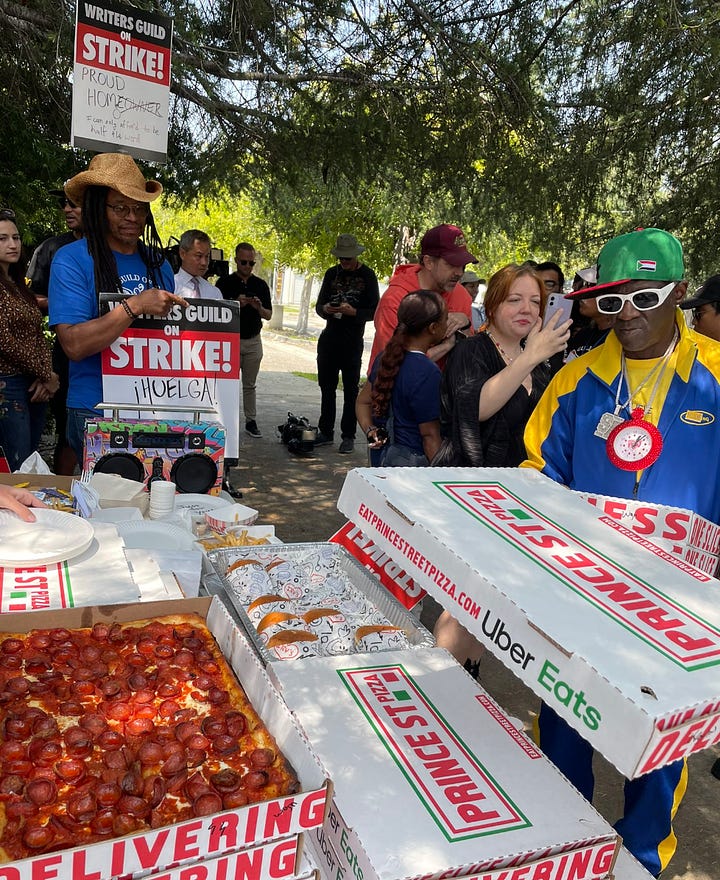
LET THE HATE FLOW THROUGH YOU (OR: MARRIAGE-SCHMARRIAGE)
At this point in the strike, nearly four weeks in, these lot coordinators finally have a grasp of what they’re doing and how to manage what amounts to a full-time job – with a lot of overtime. Judalina Neira says her husband still hates her for what this responsibility has done to their home life. “But it’s getting better,” she added, laughing.
SING THEIR PRAISES, SING THEM LOUD
“When we win, it will be because [these lot coordinators] helped keep our spirits up and hold us all together,” Angelina Burnett told me.
She’s not wrong. Lot coordinators and the many strike captains supporting them — all of them Guild heroes, as far as I’m concerned — are holding this strike together with their passion, commitment, and plenty of metaphorical duct tape. Hopefully, none of us forget it, either.
A CORRECTION
Judalina’s husband has contacted me to let me know he doesn’t actually hate her…that much.
You can read more about the WGA strike here:
The WGA Is on Strike — Here’s Why We’ll Win
Why AI Is the Most Important Issue in the Writers' Strike
The WGA Strike in Photographs: A 'People's History' by J.W. Hendricks
The Tragedy of Howard Rodman Sr. (or: Why the Writers Guild Is on Strike)
A Matter of Survival: How the WGA Is Trying to Save Feature Screenwriters
If these articles and the time I spent on them added anything to your life, please consider buying me a coffee so I can keep this newsletter free for everyone.
PSALMS FOR THE END OF THE WORLD is now available from Headline Books, Hachette Australia, and more. You can order it here no matter where you are in the world.
Photographs by Brittany Woodside can be found at their website. You can also find them at Twitter, where they share their photos of the strike.
Photographs by J.W. Hendricks can be found at their website. You can also find them at Twitter, where they share their photos of the strike.






